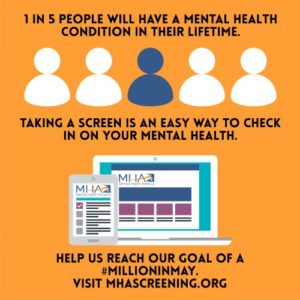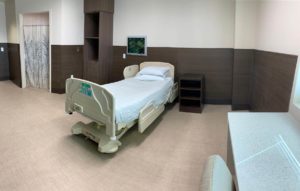May is mental health awareness month
While outdoors enjoying activities in the sun, take care to remain safe. According to www.healthyaging.net, there are four major components to
healthy aging.
- Physical Fitness: Do 30 minutes of aerobic and weight bearing exercise
daily. Remaining physically active can lead to increased blood-flow and
oxygen to the mind and body. Eat well-balanced meals and avoid high
amounts of fats and sugars. - Social Well-being: Maintain close contact with friends, neighbors and
family via phone, text, social media, skype/zoom/facetime. - Mental Wellness: Remain busy by developing a hobby, reading, or learning
about something that interests you. Keep your mind focused on the
positive things in your life, and develop coping mechanisms for those
challenges that come your way – be in charge of your life. - Financial Fitness: Save at least 10% of your income to invest in savings
plans. Give yourself goals to achieve – saving for that special family trip, or
new car.
The positive aspects of our lives can only be enhanced if we follow these
components – not only in May, but also year-round.
HOW DOES DEPRESSION IN THE ELDERLY DIFFER FROM DEPRESSION IN YOUNGER PEOPLE?

Depression in later life is, for many reasons, is harder to diagnoseat times. Symptoms are often thought of as part of the aging process, symptoms of other illnesses, or just a “sign of slowing down.” Depression frequently coexists with other medical illnesses and disabilities. In addition, advancing age is often accompanied by loss of key social support systems due to the
death of a spouse or siblings, retirement and/or relocation to anew home or town.
Because of their change in circumstances and the fact that they’re expected to slow down, doctors and family may miss the diagnosis of depression in the elderly people, delaying effective treatment. As a result, many seniorsfind themselves having to cope with symptoms that could otherwise be easily treated.
Ensuring that an elderly person is evaluated and treated – even if the depression is mild at the onset, is extremely important. Depression tends to last longer in the elderly. It also doubles their risk to develop cardiac diseases and increases their risk of death from illness, while reducing their ability to rehabilitate.
Studies of nursing home patients with physical illnesses have shown that the presence of depression substantially increased the likelihood of death from those illnesses. Depression also has been associated with increased risk of death following a heart attack.
The National Institute of Mental Health considers depression in people age 65 and older to be a major public health problem. The risk of suicide is a serious concern among elderly patients with depression. Elderly white men are at greater risk, with suicide rates in people age 80 to 84 more than twice that of the general population.
SUMMIT HEALTHCARE SENIOR BEHAVIORAL HEALTH UNIT
Located in Show Low, Arizona is a 12 bed short-term inpatienttreatment program for adults 55 and over who are experiencingsevere behavioral and/or emotional symptoms.
The unit is designed to provide stabilization and individualized care in
a safe and supportive environment.
If you, or someone you know may benefit from our program please call our intake number at 928-537-6890 andwe would be happy to answer your questions and provide care to you or your loved one.





